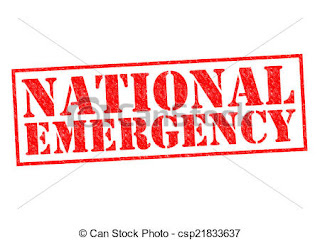Article-352
Proclamation of National Emergency :- National Emergency proclaimed by the President under article 352. Whenever the President satisfied that there exists a grave Emergency in which the security of India or any part of its in danger by reason of war or external aggression or armed rebellion, the proclamation of national emergency in relation to the whole india or any part of its can do.The word armed rebellion was replaced by the world internal disturbance in the original constitution, which was replaced by the 44th Constitutional Amendment act 1978. If the President convinced that a crisis of war or external aggression or armed rebellion imminent he can declare National Emergency. That is a proclamation of national Emergency can be made even before the actual occurrence of an attack or external aggression or armed rebellion. (By the 44th constitutional amendment act). The President makes a proclamation of national Emergency when the Cabinet has given written notice of a decision to that effect. The requirement of written notice was added by the 44th Constitutional amendment act. In 1975, the then Prime Minister Mrs. Indira Gandhi secretly declared Emergency by sending information to the President about internal disturbance. Cabinet informed after proclamation . It's a kind of autocracy. This provision was made so that it should not be repeated in future.
The President can change or withdraw the Proclamation issued by him after this by a subsequent Proclamation. [Article 352(2)]
The President has the power of different proclamation on different grounds on the grounds of war or external aggression or armed rebellion or on the grounds imminent danger of war or external aggression or armed rebellion. The power was given to the President by the 38th Constitutional amendment act 1975. When Emergency declared in 1975, the emergency management declared on the basis of the external aggression in 1971.
In order to give legitimacy to the 1975 proclamation the 38th Constitutional amendment had insert the provisions of chapter 9 with retrospective effect.
Approval of Proclamation
Every proclamation made by the President must be laid before the both houses of Parliament for the approval except withdraw . If both houses do not approve the proclamation within one month the the proclamation will automatically expire. But the proclamation is made when the Lok sabha is dissolve or it is dissolve within one month and has been approved by the Rajya sabha , it must be approved by the lok sabha within in 30 days from the first sitting to be held otherwise it is not in operation. The resolution to approve proclamation is passed by each house by a majority of its total number of members and two thirds majority of the members present and voting . It is also called special majority.
Period of proclamation
Once approved a proclamation of Emergency remains in discourse for six months .If not already withdrawn.
The period of six months is counted from the date of the passing resolution by the other house. For its continuous beyond 6 months re approval by the both houses of parliament is necessary. The number of times a resolution approving the continuation of the proclamation is passed by the both houses so many times the proclamations remains in force for a period of six months.
Revoketion of Proclamation
The proclamation of Emergency can be withdrawn by the president at any time by the subsequent proclamation. The withdrawal proclamation need not be was approved by the parliament. Lok sabha was also given the right to withdraw the emergency proclamation . If the Lok Sabha passes a resolution to withdraw the Proclamation by a simple majority, the President would be bound to withdraw the Proclamation. If one tenth of the total number of members of the lok sabha has written an intention to move a resolution withdrawing the proclamation of Emergency- 1- to the speaker (While the Lok Sabha is in session)
2- to the president (Do not be in Lok Sabha session.)
Special sitting of the Lok Sabha for the consideration of the resolution by the Speaker or the President within 14 days from the receipt of such notice
Effect of Proclamation
●In case of emergency, the executive power of the state works under the central executive.
● The power of Parliament is extended and can make laws on any subject in the State List. During this the power of making laws of the state legislature does not expire, only suspended. Expiry after six months if there is no enforcement the proclamation of law made by the Parliament. (Article 250)
● President orders change in the relationship between the Union and the states related to the distribution of revenue
● suspension of fundamental rights during emergency. According to Article 358, when a proclamation of emergency made on the ground of war or external aggression is in change, the right to freedom guaranteed by Article 19 becomes suspended.
● Under Article 369 the President was given the power to suspend the right to modify the Fundamental Rights.
●Parliament has the right to extend the term of the Lok Sabha for one year at a time, but its extension should not be more than six months if there is no enforcement of the emergency.
● Parliament can pass a resolution to extend the term of President's rule in a state beyond one year ( maximum 3years).If the Election Commission certifies that due to difficulty in election, it is necessary to extend President's rule
● Parliament may by law extend the term of the Legislative Assembly which shall not exceed one year at a time and in no case exceed a period of six months after the proclamation of emergency has expired.








0 Comments